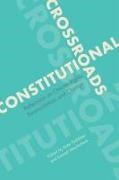En savoir plus
Four decades after the adoption of the
Constitution Act, 1982,
Constitutional Crossroads assesses its legacy, focusing on the themes of rights, reconciliation, and constitutional change.
Table des matières
Introduction: Complex Legacies: The Promise, Challenges, and Impact of the
Constitution Act, 1982 / Emmett Macfarlane and Kate Puddister Part 1: Institutional Relationships1 The Political Purposes of the Charter: Four Decades Later /
Mark S. Harding 2 Revisiting Judicial Activism /
Emmett Macfarlane 3 Revisiting the Charter Centralization Thesis /
Gerald Baier 4 Autochthony and Influence: The Charter's Place in Transnational Constitutional Discourse /
Mark Tushnet 5 It Works in Practice, but Does It Work in Theory? Accepting the
Canadian Charter of Rights and Freedoms as a National Symbol /
Andrew McDougall 6 Charter Talk: How Canadian Media Cover Rights and Politics /
Erin Crandall, Andrea Lawlor, and Kate Puddister 7 Notwithstanding the Media: Section 33 of the Charter after
Toronto v Ontario / Dave Snow and Eleni Nicolaides Part 2: Charter Rights8 Policing Partisan Self-Interest? The Charter and Election Law in Canada /
Tamara A. Small 9 The Most Important Charter Right? The Rise and Future of Section 7 /
Matthew Hennigar 10 Sex Work, Abjection, and the Constitution /
Brenda Cossman 11
Carter Compliance: Litigating for Access to Medical Assistance in Dying in Canada /
Eleni Nicolaides12 The Charter and the RCMP /
Kent Roach 13 The Charter of Whites: Systemic Racism and Critical Race Equality in Canada /
Joshua Sealy-Harrington 14 Canada's Sex Problem: Section 15 and Women's Rights /
Kerri A. Froc 15 Quebec and the "Sign Law" Thirty Years after
Ford and
Devine: Ford Construit Solide /
James B. Kelly 16 Language Rights and the Charter: Forging the Next Forty Years /
Stéphanie Chouinard 17 The Provincial Courts of Appeal and Section 24(2) of the Charter /
Lori Hausegger, Danielle McNabb, and Troy RiddellPart 3: Reconciliation18 Canadians' Homeland Has Changed since Patriation Brought the Constitution Home /
Peter H. Russell19 Indigenous Rights and the
Constitution Act, 1982: Forty Years On and Still Fishing for Rights /
Jeremy Patzer and Kiera Ladner 20 Using the Master's Institutional Instruments to Dismantle the Master's Goal of Indigenous-Rights Certainty /
Rebecca Major and Cynthia Stirbys 21 Beyond Consultation: A Research Agenda to Investigate Partnerships and Comanagement in Land Governance /
Minh Do 22 Indigenous Sovereignty, Canadian Constitutionalism, and
Citizens Plus: The Unended Quest of Canada's Original Hedgefox /
Samuel V. LaSelvaPart 4: Constitutional Change23 The Invisible Transformation of Canada's Constitutional Amendment Rules /
Richard Albert 24 Still Not Cheering: Understanding Quebec's Perspective on 1982 /
Félix Mathieu and Dave Guénette 25 Cracks in the Foundation: The Crown and Canada's Constitutional Architecture /
Philippe Lagassé 26 The Urban Gap /
Ran Hirschl Index
A propos de l'auteur
Kate Puddister is an associate professor of political science at the University of Guelph and the author of
Seeking the Court's Advice: The Politics of the Canadian Reference Power. Emmett Macfarlane is an associate professor of political science at the University of Waterloo. Among his publications are
Constitutional Amendment in Canada;
Policy Change, Courts, and the Canadian Constitution; and
Constitutional Pariah: Reference re Senate Reform
and the Future of Parliament.Contributors: Richard Albert, Gerald Baier, Stéphanie Chouinard, Brenda Cossman, Erin Crandall, Minh Do, Kerri A. Froc, Dave Guénette, Mark S. Harding, Lori Hausegger, Matthew Hennigar, Ran Hirschl, James B. Kelly, Kiera Ladner, Philippe Lagassé, Samuel V. LaSelva, Andrea Lawlor, Rebecca Major, Félix Mathieu, Andrew McDougall, Danielle McNabb, Eleni Nicolaides, Jeremy Patzer, Troy Riddell, Kent Roach, Peter H. Russell, Joshua Sealy-Harrington, Tamara A. Small, Dave Snow, Cynthia Stirbys, Mark Tushnet
Résumé
Four decades after the adoption of the Constitution Act, 1982, Constitutional Crossroads assesses its legacy, focusing on the themes of rights, reconciliation, and constitutional change.

